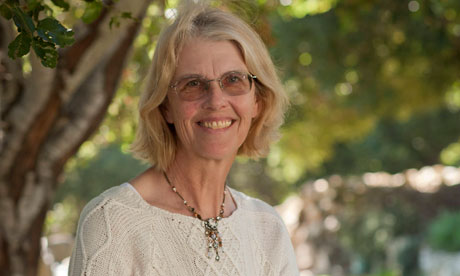
It was inevitable that Jane Smiley, a Pulitzer prize-winning novelist who also breeds racehorses, would at some point turn her hand to a pony book. After all, she's experimented with pretty much every other genre going, from satire to romance to full-blooded tragedy, and the sound of hooves resounds through almost all of them. Nobody's Horse (Faber £6.99) tells the story of Abby Lovitt, the 12-year-old daughter of a fundamental Christian horse dealer. She's not supposed to get attached to the animals that come and go in their Californian yard, any more than she's supposed to learn about evolution or cheek her parents, but that's not an easy rule to follow when you spend every day in the saddle.
Abby's a brilliant heroine; self-possessed, moral and permanently on the verge of major trouble. Serious riders will appreciate the training tips – including a thorough debunking of a famous scene from The Horse Whisperer – but even those immune to the lure of the stable will empathise with the trials and tribulations of being a seventh grader. It's not always easy to switch from adult to children's fiction, but Smiley makes it look effortless.
The same can't be said of the thriller writer John Grisham, whose new series aimed specifically at a youthful audience kicks off with Theodore Boone: Young Lawyer (Hodder £12.99). Unlike Smiley, Grisham hasn't grasped the first lesson of children's fiction – namely that everyone loves an underdog. Theodore Boone is only 13 but he's already an accomplished law expert, revered by everyone from his classmates and teachers to the town judge. Weirdly, none of them seem to have noticed what an insufferably smug little twerp he is. What's more, the plot, which revolves around a local murder trial, never approaches any sort of resolution. Evidently, the denouement is being postponed for further instalments of Theodore's glorious career.
Miraculously, Bitter Chocolate by Sally Grindley (Bloomsbury £5.99) manages to avoid such smugness despite its self-evidently worthy credentials. Grindley is steadily establishing herself as an author of meticulously researched novels about children in unpleasant circumstances across the world, from being sold into slavery in China to being orphaned by Aids in Africa. This time, it's the turn of child labourers on a cocoa plantation. Though sometimes barely distinguishable from an Amnesty International case study, Bitter Chocolate maintains its intensity by focusing tightly on Pascal, a former boy soldier who's haunted by the violent acts he was forced to perform in his homeland of Guinea. Like Theodore Boone, Bitter Chocolate is a little let down by an unsatisfactory ending, though if that means a sequel's on the way I for one would be delighted.
There's no sign of agendas in The Ogre of Oglefort by Eva Ibbotson (Macmillan £9.99), no social commentary or consciousness raising; just a wonderfully playful story about some bewitchingly strange people. The Hag grew up in an enchanted marsh, but when it was turned into a building site she took refuge in postwar London, running a boarding house for other vaguely magical types. All is calm, if a little dull, until the residents of 26 Whipple Road are inveigled into killing an ogre. Accompanied by Ivo, a human boy who's desperate to escape his miserable orphanage, they set off on a quest that sees all sorts of fairytale cliches turned inside out. Ibbotson is an exceptionally adept writer and this gleeful story is pitch perfect, right down to its resoundingly satisfying ending.

